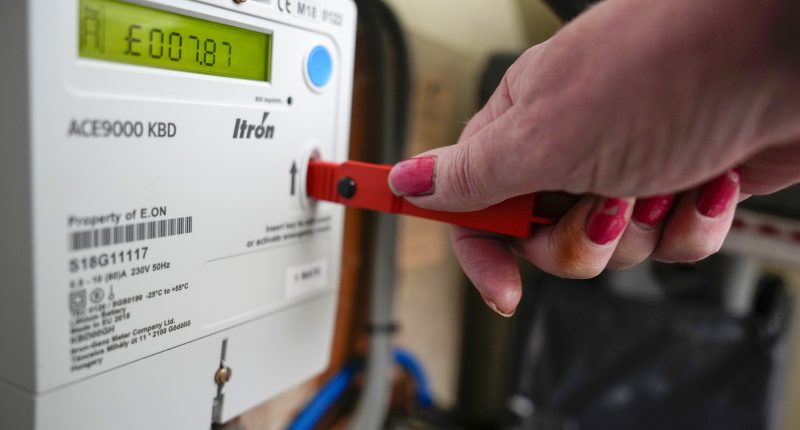ENERGY bills are still weighing heavy on people’s minds and wallets.
Ofgem‘s price cap rose from £1,834 a year, the lowest figure since March 2022, to £1,928 a year on January 1.
It means the average household will now see their annual bill increase by £94.
The price of electricity has risen from 27.35p per kWh to 28.62p per kWh.
The unit rate for gas has risen from 6.89p per kWh to 7.42p per kWh.
Households on prepayment meters will continue to receive a government-backed discount to ensure that they aren’t charged more than those who pay by direct debit.
Read more in money
But it’s important to note though that this is not a cap on the overall amount people will pay for their energy.
Instead, it caps the amount that they pay per kilowatt hour, or unit, of gas and electricity.
The £1,928 figure is calculated based on what Ofgem thinks an average household will use.
This is calculated assuming that a typical household uses 2,700 kWh of electricity and 11,500 kWh of gas over a 12-month period.
Most read in Money
If you have a prepayment meter, you pay for your gas and electricity prior to use, by topping up a meter at a shop or online.
The meters are often installed in homes that have fallen into debt or by landlords in some rental properties.
But you might also wonder what a prepayment meter means for your energy bills.
What will happen to prepayment energy bill prices?
Households on prepayment meters receive a government-backed discount to ensure they aren’t charged more than those who pay by direct debit.
This change was brought in on July 1, 2023.
Previously, the cost had been higher for people with prepayment meters due to the costs of setting up and maintaining meters.
In last year’s Spring Budget, this was quashed, and it is now no more expensive to have a prepayment meter than pay in arrears.
But if you’re in debt with your supplier and on a prepayment meter, the amount you owe can be deducted when you next top up.
How much of the top-up goes towards paying off the debt depends on your energy company – but it can be up to 100% in some cases.
That leaves people with less money to spend on their current energy needs, including heating and lighting.
All the major energy companies, including British Gas, Eon, EDF and Scottish Power, can take up to 100% off a top-up to cover electricity debts.
For example, if your agreed weekly debt repayment amount is £10 for electricity and you top up £10, the firms will put the full amount towards your debt and leave you nothing for current usage.
The exact proportion of a top-up that goes on paying back debts will depend on how much a customer has agreed to repay and how much they are topping up.
Regarding gas debts, the maximum deduction is 90% for British Gas prepayment customers.
Eon, EDF, Octopus, Ovo and Scottish Power deduct up to 70%, while the maximum deducted by Bulb is 30%.
What can you do if you’re struggling to pay for your energy?
You can take some measures if you’re struggling to pay for your energy.
If you fall into debt, you can always approach your supplier to see if they can put you on a repayment plan before putting you on a prepayment meter.
This involves paying off what you owe in installments over a set period of time.
If your supplier offers you a repayment plan you don’t think you can afford, speak to them again to see if you can negotiate a better deal.
Beyond this, several suppliers offer customers grants if they’re struggling to pay energy bills.
A grant is a sum of money you don’t have to pay back, so it’s essentially free cash.
British Gas, Scottish Power, Ovo Energy, E.On, E.On Next, EDF, Octopus Energy and Shell Energy offer grants.
Plus, thousands of vulnerable households are missing out on extra help and protections by not signing up to the Priority Services Register (PSR).
The service helps support vulnerable households, such as those who are elderly or ill, and some of the perks include being given advance warning of blackouts, free gas safety checks and extra support if you’re struggling.
Not everyone is eligible for the Priority Services Register. Your energy firm must deem you to be vulnerable.
This could apply to you if you:
- Have reached state pension age
- You are disabled or have a long-term medical condition
- You are recovering from an injury
- Have a hearing or sight condition
- Have a mental health condition
- You are pregnant or have young children
- You need to use medical equipment that requires a power supply
There could be other situations where you’re eligible too, like if you need short-term support after a hospital stay.
For full details on eligibility, visit Ofgem’s website.
Get in touch with your energy firm to see if you can apply.
What other energy bill help can I get this winter?
Thousands of households are due up to £25 in free cash after cold weather payments were triggered in hundreds of postcodes.
The Department for Work and Pensions (DWP) hands out the free cash to help support hard-up Brits during cold spells.
And eligible households get the cash paid directly into their bank accounts within 14 days.
The cold weather payments are made in locations where residents experience continuous below-zero weather.
Households can get £25 during each seven-day period of low temperatures from now until March 31.
Cold weather payments were triggered in almost 300 postcodes in November – meaning that thousands of households are owed cash.
Plus, millions are due up to £600 in winter fuel payments.
You should have received yours by January 26, 2024 at the latest.
If you haven’t got your payment by then, you need to call the office that pays your benefits.
Those details can be found in the letters they have sent you.
And if you’re found to be ineligible for the winter fuel payment but want to challenge that decision, there’s a government form for that, too.
Millions on benefits will also receive the final £299 cost of living payment in February.
Read more on The Sun
We’ve previously explained who’s eligible and whether you’ll need to act to get it.
Additional support is also offered by councils in the UK through the Household Support Fund.
Do you have a money problem that needs sorting? Get in touch by emailing [email protected].
Plus, you can join our Sun Money Chats and Tips Facebook group to share your tips and stories.










